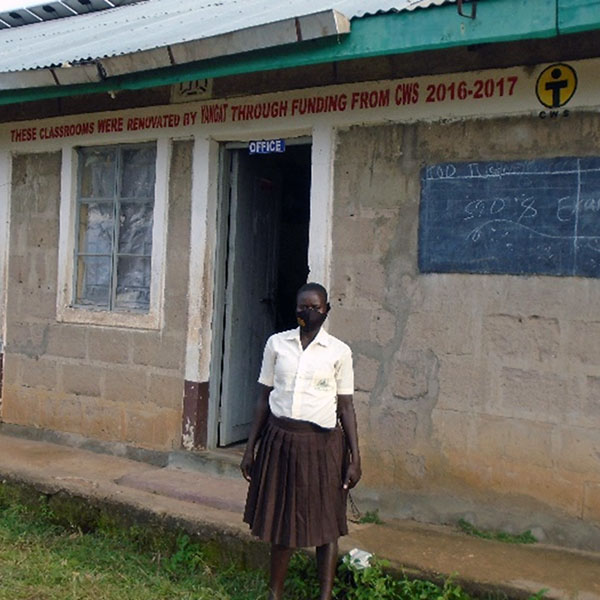Stories of Change

Linnet stands in front of a classroom at Chepkram Primary School.
Given the Chance, Girls in Kenya Become Trailblazers
When Linnet was young, her future was nearly guaranteed. And the outlook was bleak.
Linnet lives in a rural part of western Kenya. In her community, being a girl is a disadvantage. The chances of a girl finishing school are slim. Girls are expected to care for their families and younger siblings. And considering that schools are usually far away from where families live, just getting to and from school every day can be dangerous and prohibitive. Girls as young as 12 are married off to older men. Many are forced to go through female genital mutilation, known as FGM, a harmful traditional practice meant to mark a transition to adulthood. The chances of a girl dropping out of school are much higher than the chances that she graduates.
This was Linnet’s world when she started going to Chepkram Primary School as a child. She describes the school as “stagnated” at that time. Her community was set in its ways; most girls went through FGM and were married off young. When that was each girl’s future, why would she need to finish school?
Things changed when Linnet was 11 and her school joined a CWS program focused on education and improving schools. Through the program, the school made some big changes. Soon there was a new dormitory for girls on the school grounds so that the female students could live safely at the school. New water taps meant access to water on the school grounds, and new bathrooms guaranteed the dignity of students who needed to relieve themselves. Linnet and her classmates began to feel more secure.
Security came hand in hand with hope. The CWS program reached far beyond the school grounds to engage the community in conversations about girls’ educations. Why not let girls stay in school and finish their educations? What new careers and opportunities could that open up for them?
Linnet is 15 today. She’s in grade 8 and will soon be sitting for the Kenya Certificate of Primary Education. “Your training on life skills greatly helped build my confidence,” she told a CWS team member recently. “It strengthened my understanding of the possibility of girls excelling in different spheres of life through education. I did not know it was possible for girls in our school to reach the level I’m in today.”
The school has been around for 16 years, but Linnet is in only the third round of girls to sit for the exams. “The reason why the school stagnated all those years was because of the lack of knowledge among us girls and our parents about how it could be possible for girls in this region to proceed to higher levels of education through our commitment to learning, as opposed to being subjected to retrogressive cultural practices like FGM and child marriage,” she says. “Now, for me, this has become a thing of the past. Both my parents and I understand the importance of education, and I’m determined to reach the greatest level of education excellence in the future.”
